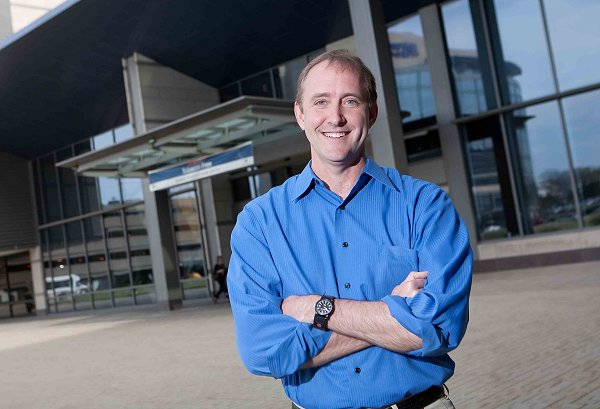
When Patrick Griswold graduates with a master of science in nursing in the nurse educator track from the Graduate School of Nursing (GSN) this Sunday, his academic qualifications will allow him to combine all his professional interests. In fact, he has two dream jobs already lined up: teaching in academia and staying connected to patients as a staff nurse.
Griswold was at a crossroads in his career after more than 20 years in mental health and addictions counseling. “I chose the nurse educator track because, having taught about addictions, I wanted to add nursing knowledge to that role,” he explained. “And I chose the GSN for the reputation of UMass and the opportunity to study at an academic health sciences center.”
Having previously earned a bachelor’s in psychology from Hamilton College and a master’s in counseling psychology from UMass Boston, Griswold entered the GSN’s Graduate Entry Pathway (GEP), an innovative nursing workforce development option for individuals with an undergraduate degree in a field other than nursing.
“When I was an undergraduate I actually started in pre-med, but while dissecting my pig, I was more interested in talking to it than cutting it open, so I switched to psychology,” he recalled. Beginning as a mental health counselor for a residential program working with adults with major mental illness, he moved into addictions treatment, working at a community agency where he was progressively promoted to become the program director. Now he will use his nurse educator preparation to train hospital nursing staff how to best manage patients with psychiatric and/or addictive disorders, as well as to teach undergraduate nursing students.
Griswold has always been around nurses both professionally and personally. “Both mental health and addictions treatment utilize nurses in interesting ways and I frequently worked with nursing supervisors, including one who was instrumental in starting methadone treatment in Massachusetts.” His mother’s nursing career also greatly influenced Griswold both before and after he became a registered nurse, which is a pivotal milestone in the GEP program. But while most GEP students go on to become nurse practitioners, Griswold again took a nontraditional path as the only member of his class to become a nurse educator.
To fulfill the nurse educator’s requirement for a rotation in an undergraduate nursing program Griswold precepted a community health class at the Massachusetts College of Pharmacy and Health Sciences’ (MCPHS) School of Nursing in Boston. There he supervised students in community health settings as well as teaching them about addictions and substance abuse in the classroom. This experience led directly to a job offer: This fall Griswold will be an adjunct clinical instructor for a psychiatric nursing clinical rotation at MCPHS, using his former employer’s substance abuse agency as the clinical site.
In the second job for which his GSN studies qualified him, he will continue to work weekends and per diem as a staff nurse at the Faulkner Hospital inpatient addiction detox unit, also in Boston. “I think that in order to be an effective educator and administrator, one should remain directly connected to patients and direct care, so continuing to work shifts on a unit or in a clinic is important,” he explained.
Combining as they do teaching, patient care and addiction treatment, his new jobs suit him well. “In these roles I’m doing exactly what I wanted to!” Griswold said. “It’s almost unbelievable that I can do this right after graduation. My experience at the GSN did exactly what I had hoped it would do in terms of academics and preparing me for my future career goal.”
What he didn’t expect was the quality of the relationships he developed at the GSN. “It’s such a nice bonus that I’ve gained what I know will be lifelong friendships and professional connections.”
Related links:
Student speakers offer words of wisdom
Hendrickson working to improve addiction treatment
SOM student speaker headed for his toughest job yet: neurosurgeon